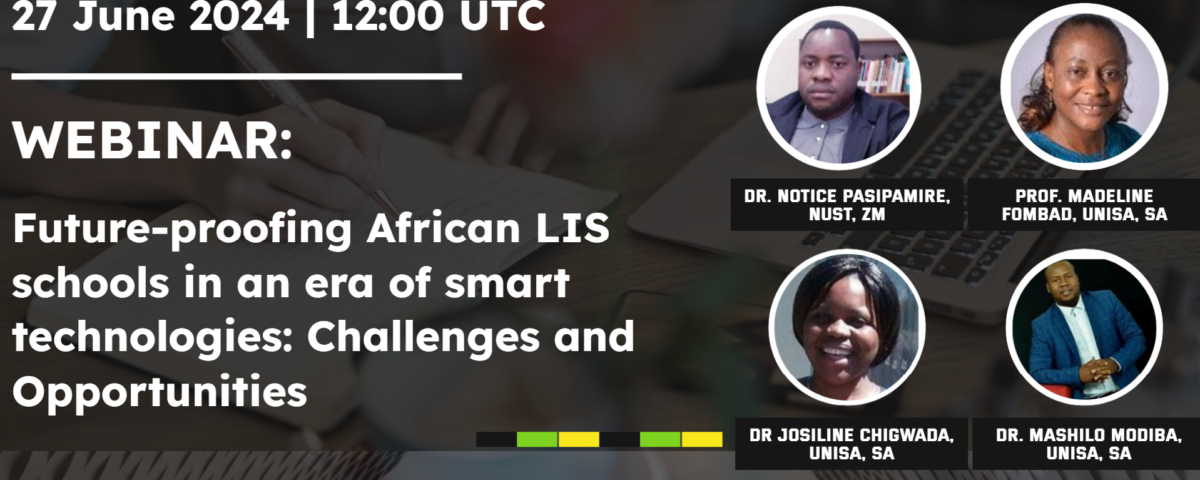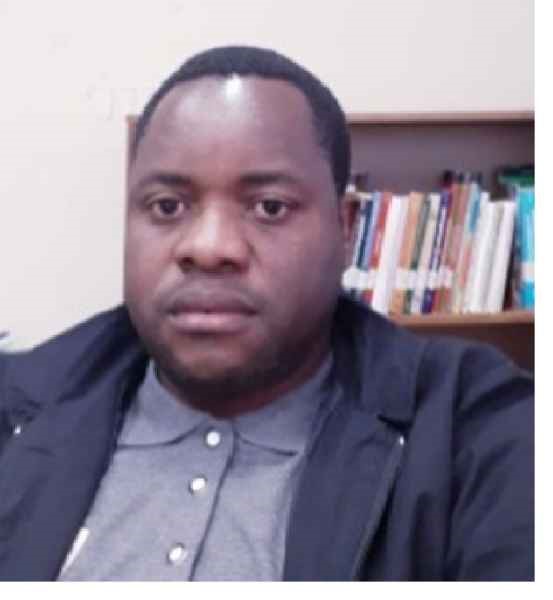Webinar: Future-proofing African LIS schools in an era of smart technologies: Challenges and Opportunities

10 JUNE 2023
Overview
Library and information science work is experiencing constant technological changes due to the fourth industrial revolution (4IR). As a result of 4IR, new technologies such as artificial intelligence (AI), the Internet of Things (IoT), big data, cloud computing and nanotechnology enable efficient and quick delivery of services, including libraries and information services, in a variety of fields (Cao et al., 2018; Modiba, 2021).
This momentous technological revolution has the potential to transform libraries into smart libraries and provide smart services to smart people based in smart cities. A smart library uses smart technology and provides users with the convenience of fulfilling their requirements themselves without needing help from staff or wasting their valuable time.
The aforementioned fifth generation libraries enable remote control of the library building, including automatic doors, public access computers and a self-service kiosk. Smart libraries provide services to support smart library users in a smart way. Although these emerging technologies offer LIS schools a number of opportunities and challenges, Africa as a global south continent does not escape the digital divide, as some libraries are resource-endowed and others are resource-strapped. Library and Information Science (LIS) schools have an enormous role to play in shaping the future of information professionals in the era of the Fourth Industrial Revolution (4IR).
Thus, today, it has become more crucial than ever to advocate for more robust information literacy programs within LIS schools Indeed, Information literacy, the ability to access, evaluate, and effectively use information, is essential for navigating the complexities of the digital age, particularly in the context of AI-driven information systems. Nevertheless, AI has reshaped the information landscape, posing both opportunities and challenges for information professionals. Preparing for the future and developing ways to minimize the effects of future shocks and stresses is referred to as future-proofing.
Therefore it is incumbent upon LIS schools to debate and generate praxis-oriented solutions to ensure the survival of LIS schools and the LIS profession amidst the seismic shifts in the infosphere. It is the aim of the webinar “Future-proofing LIS schools in an era of smart technologies: Challenges and Opportunities for LIS schools in Africa” that LIS educators will have an opportunity to share ideas that will inform LIS schools on how LIS education should evolve in light of the academic and practical demands of the new brave world.
Target audience
- LIS Educators
- Librarians
- Archivists
- Museum professionals
- Students
Date – Thursday, 27th June 2024
Time – 12 noon UTC | 1pm WAT | 2pm CAT/SAST | 3pm EAT
Registration
Click on the button below to register.
Kindly note that once you register, you will receive reminders about the event.
Resource person

Dr. Notice Pasipamire is a Lecturer and Acting Chairperson of the Department of Library and Information Sciences, National University of Science and Technology, Bulawayo, Zimbabwe. He holds a PhD in Information Studies (University of KwaZulu-Natal (UKZN) – 2018), MPhil in Library and Information Science from the National University Of Science and Technology (2012), Postgraduate Diploma in Higher Education from the National University Of Science and Technology (2011) and Bachelor of Science Honours Degree In Library and Information Science from the National University of Science and Technology (2008). He is a prolific writer and researcher who has contributed immensely to LIS education and practice through teaching, research and advocacy.

Dr. Mashilo Modiba is a Senior Lecturer at the University of South Africa (UNISA), in the Department of Information Science. In April 2023, he was privileged to be a resident at the Faberllul Olot Residency on Artificial Intelligence and Archives, hosted at Spain (Olot and Girona). Dr. Modiba is the chairperson for the Research and Innovation Portfolio within the Department of Information Science, UNISA, and an active member of the College of Human Science (CHS) Research Committee and the CHS AI Task Team. He is also a member of the Unisa AI Task Team and the Research Development Academy. He has research interests in IoT, blockchain, big data, cloud computing, AI, as well as robotic and cobotic machines, particularly in the context of library and information services, archives, records management, and student support. Beyond academic pursuits, Dr. Mondiba is also an author, having penned the motivational book titled, “From Agony to Glory – A Journey of Perseverance.”

Dr. Josiline Chigwada is a Post Doctoral Research Fellow, UNISA, Department of Information Science to School of Interdisciplinary Research and Graduate Studies. She is a librarian with 17 years of experience in academic librarianship. She holds an Information Science doctorate from UNISA and a Postgraduate Diploma in Higher Education. She is a member of the Library and Information Association of South Africa (LIASA), SPARC Africa Management Committee, Zimbabwe Library Association (ZIMLA), Zimbabwe Young Academy of Science, Association for Information Science and Technology (ASIS&T), International Association of Social Science Information Service and Technology (IASSIST), and the Rotary Club of Msasa, Harare. She has authored on indigenous knowledge, open science, research data management, information and digital literacy, academic librarianship, and contemporary library and information science issues. She is an editorial board member of the IFLA journal on Sage database and Journal of Web Librarianship on Taylor and Francis database.

Madeline C. Fombad is a Professor at the Department of Information Science at UNISA. She holds a PhD in knowledge management from the University of Pretoria, South Africa. Her broad research interest lies in knowledge management; knowledge management for sustainable development, knowledge management education information communication technologies, open access and libraries. She holds numerous qualifications including a Master’s Degree in Library and Information Studies (University of Botswana) and a Doctor Philosophiae (PhD) Information Science with specialization in Knowledge Management (University of Pretoria). Her contributions to LIS education in Africa is quite significant as she has authored numerous peer-reviewed articles in accredited journals and also edited a book with IFLA and KG Gryuter Saur in 2023 entitled “Information Services for a Sustainable Society: Current Developments in an Era of Information Disorder”.
Moderator

Collence Takaingenhamo Chisita holds a PhD in Library and Information Science. He is a Research Fellow at the University of South Africa (UNISA) in the Department of Information Science in Pretoria, South Africa. He co-authored and co-edited 6 books and one scholarly journal, numerous book chapters and journal articles. He is the legatee of the National Research Foundation (NRF) of South Africa (C2) rating for research excellence. He has navigated the globe as a presenter and contributed to LIS through webinars. He is a member of several Library Associations such as IFLA-Indigenous Matters Section (SIG) and Zimbabwe Library Association, Library and Information Association of South Africa (LIASA) and the Secretary of the, AfLIA LETIS.
Technical requirements
Upon registration, reminders will be sent to all registrants periodically. This webinar will be hosted on Zoom Conferencing Platform. Participants, who do not have Zoom on their mobile devices and or computers, need to download, install and create an account on Zoom ahead of time (CLICK TO DOWNLOAD). Webinar attendees are encouraged to join early, preferably 15 minutes before the start of the webinar, as one may need time launch the application. The speaker will use a webcam to connect with attendees. Audio and video for the session will be streamed over computer speakers. Attendees are therefore encouraged to connect with a headset or earpiece for maximum utility.
Webinar materials
A list of resources and further information will made be available at the end of the webinar, to enable thorough engagement with the webinar content. All registrants will have access to the presentation slides. The webinar recording will be uploaded on AfLIA Youtube Channel soon after the webinar to facilitate continuous engagement with the webinar content by webinar attendees and non-attendees. Please note that this webinar does not involve certificate of participation.
Enquiries
For further enquiries and any assistance relating to the webinar, contact us at afliacomm@aflia.net.
